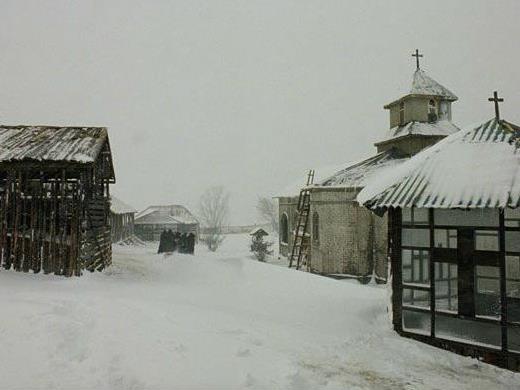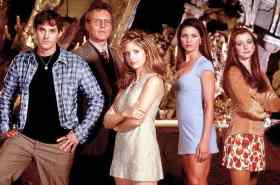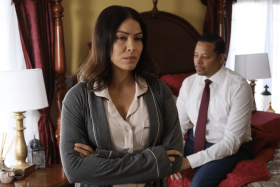Two friends hug on in a train station. It’s clear they care for each other and haven’t seen each other in a long time. One friend holds on for too long. It’s clear something has changed.
Beyond the Hills is, at its heart, the story of Voichita and Alina’s friendship (played by Cosmina Stratan and Cristina Flutur respectively). The women leaned on each other to survive in an orphange. Now in the mid-20s, Voichita in a nun and Alina has returned to Romania from working in Germany. She wants to take her friend with her, offering her an ostensibly (and, to her, clearly) better life. But Voichita is happy.
Voichita’s home consists of a church and a row of cells housing eight or so nuns and a priest known only as Father. There’s nary a modern convenience in sight: no electricity, no running water. You can almost see the chill in the air.
The conflicts between Alina, Voichita and Father rise steadily. Father dislikes Alina’s presence, believing her to be a troubling influence to those who have accepted God completely: see’s a contrarian, a trouble-maker. But she’s also unwell. Voichita begs Father to help her and he relents.
What could be a simple story about the rigidity of religion is anything but. Father may loath everything Western Europe represents to him (moral ineptitude and those blasted homosexuals) but his heart, however questionable by modern standards, is in the right place. He’s sure of it.
Beyond the Hills presents corruption in every corner. Abuse is suggested in the orphanages and the homes of adoptive parents. The hospital is useless. The monastery sits high above the town, feeding orphans at its own expense and sheltering victims of domestic abuse.
Nothing is black and white. The most rigid and didactic place is the only place offering solace.
Alina begins as an unsympathetic, selfish friend and ends as a broken person trapped in a world that can’t help. Voichita is devout, but is it due to the love of God or to hide from a dangerous world?
It’s a testament to the talent of the crew that Beyond the Hills works. Director Cristian Mungiu told Film Comment that aimed ‘to tell a story about important values by allowing the story to express itself and not impose my own interpretation’. He achieves that. Each scene is presented with minimal intrusion. No ambient music, no rapid-fire editing. Each actor fills each role with conviction. Stratan and Flutur deserve the ‘Best Actress’ award they won at Cannes; Valerui Andrita provides an intimidating and flawed priest stuck between values and superstition.
Each shot of the monastery conveys a place out of time. It’s easy to think the film takes place centuries ago until someone from the town appears with a mobile phone. The effect on the narrative is twofold: Alina inability to grasp Voichita’s dedication to the place is understandable, as is its allure to someone trying to escape.
But for all its simplicity, the monastery doesn’t allow for escape from human failure. It may try to dress it up as love for something greater, but that doesn’t change anything.
Beyond the Hills, in all its austerity and bleakness, asks the most intimate of question: how much are you willing to give up to escape the realities of the world?
Rating: 4 out of 5 stars.
Beyond the Hills
Written and directed by Cristian Mungiu
Romania, 2012, 155 minutes
Distributor: Madman
Actors:
Director:
Format:
Country:
Release:





